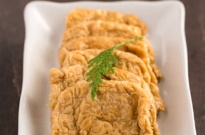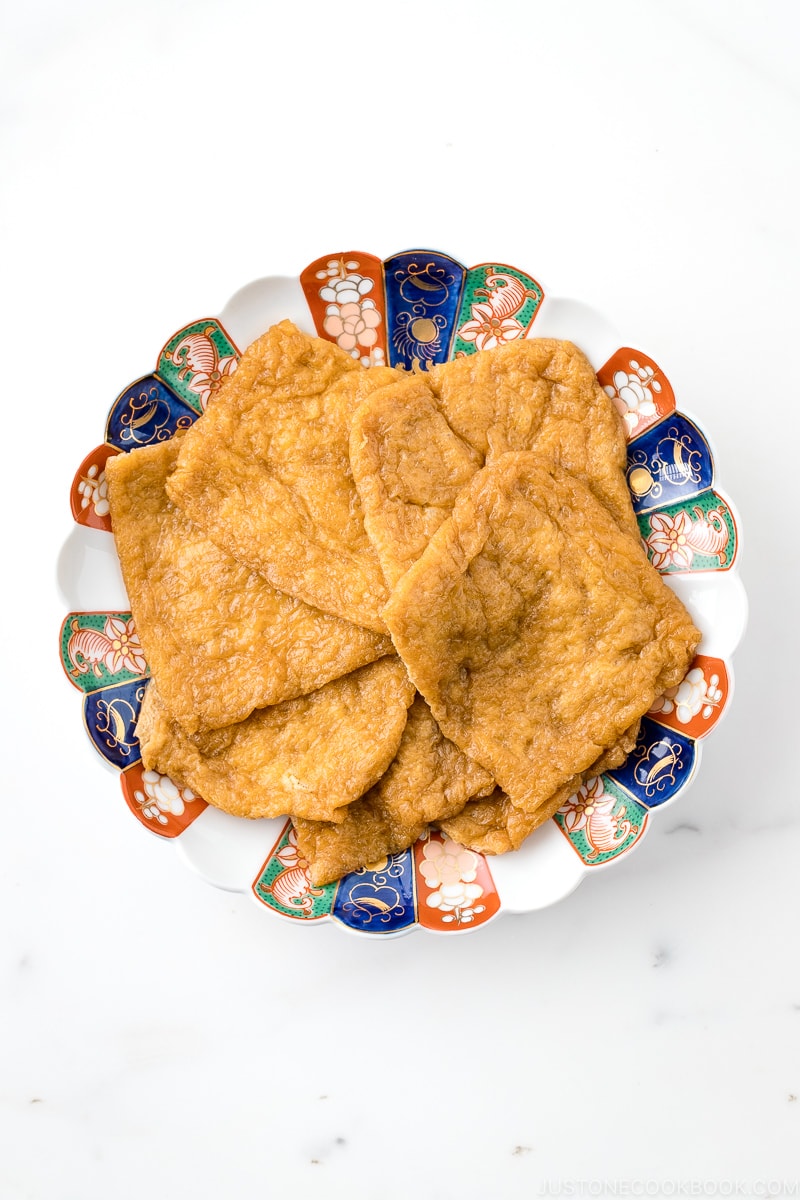
The beloved Japanese comfort dishes Inari sushi and kitsune udon have one key ingredient in common. Called Inari age, these seasoned tofu pockets take a humble vegan protein source and make it irresistibly savory, sweet, and juicy.
I often find that the store-bought version are too sweet for my liking. That’s why I prefer to season my own. It’s very simple to make Homemade Inari Age and it only takes 15 minutes! You will soon be making your own at home, too.
What is Inari Age?
Inari age (稲荷揚げ, いなりあげ) are seasoned tofu pockets. These pockets or “pouches” made of deep-fried firm tofu are called aburaage (油揚げ). To make Inari age, the tofu pockets are cooked and seasoned in a simmering broth of dashi stock, sugar, mirin, and soy sauce.
Pronounced ee-NAH-ri ah-geh, these seasoned pockets are sturdy enough to pack with rice and vegetables as in that iconic type of sushi called Inarizushi (いなり寿司). While you can skip the cooking step by buying pre-seasoned Inari age at Japanese grocery stores, Inari age is traditionally simmered and seasoned at home.
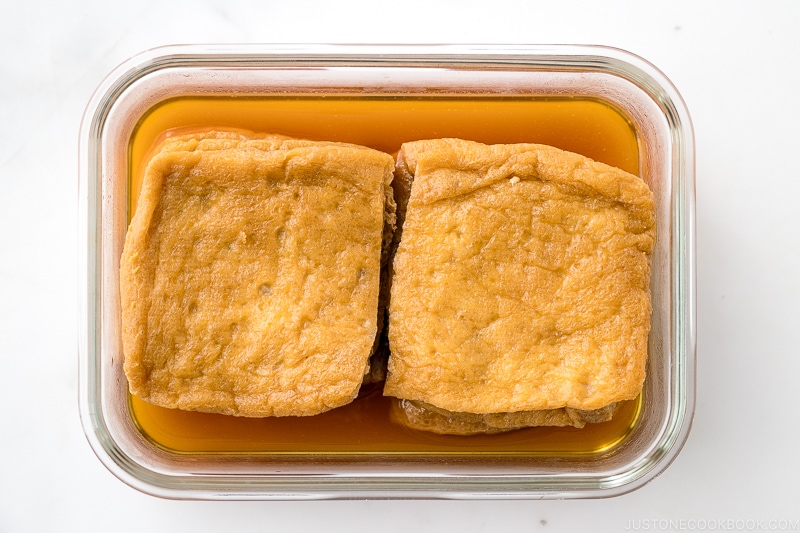
Ingredients You’ll Need
- Aburaage (fried tofu pouch/pocket) – A popular ingredient in Japanese cooking, aburaage are deep-fried tofu pouches made from soybean. This is a great pantry item to stock up on in your freezer, especially if you enjoy vegetarian/vegan Japanese dishes. To learn more about how they are made, read my aburaage page.
- Dashi (Japanese soup stock) – There are a few methods to make the Japanese soup stock. For this recipe, I used Awase Dashi made with katsuobushi (dried bonito flakes) and kombu (dried kelp). However, if you are vegetarian/vegan, you can make Kombu Dashi. Dashi is very easy to make, but you can also use a convenient dashi packet (I don’t use dashi powder).
- Soy sauce – The most basic but compulsory flavoring that gives the broth its salty and savory taste.
- Sugar – You’ll need sugar to balance the salty flavor from soy sauce, but feel free to adjust the amount.
- Mirin (Japanese sweet rice wine) – It adds mild sweetness and umami.
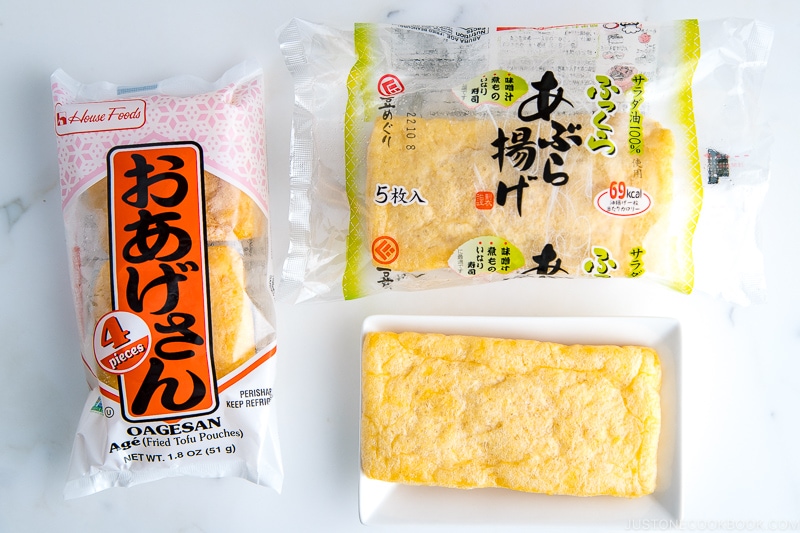
How To Make Homemade Inari Age
- Blanch the aburaage in a boiling water to remove the (factory) excess oil for a cleaner taste. Drain well in a strainer.
- Combine the sauce ingredients in a saucepan or small pot.
- Simmer the aburaage in the sauce until the sauce has almost completely evaporated.
- Set aside and let cool. The aburaage will continue to absorb more flavors while it cools down.
How To Store Inari Age
I like to make a big batch and freeze them for later use! You can store it in an airtight container in the fridge for up to 3 days or the freezer for up to 3 weeks.
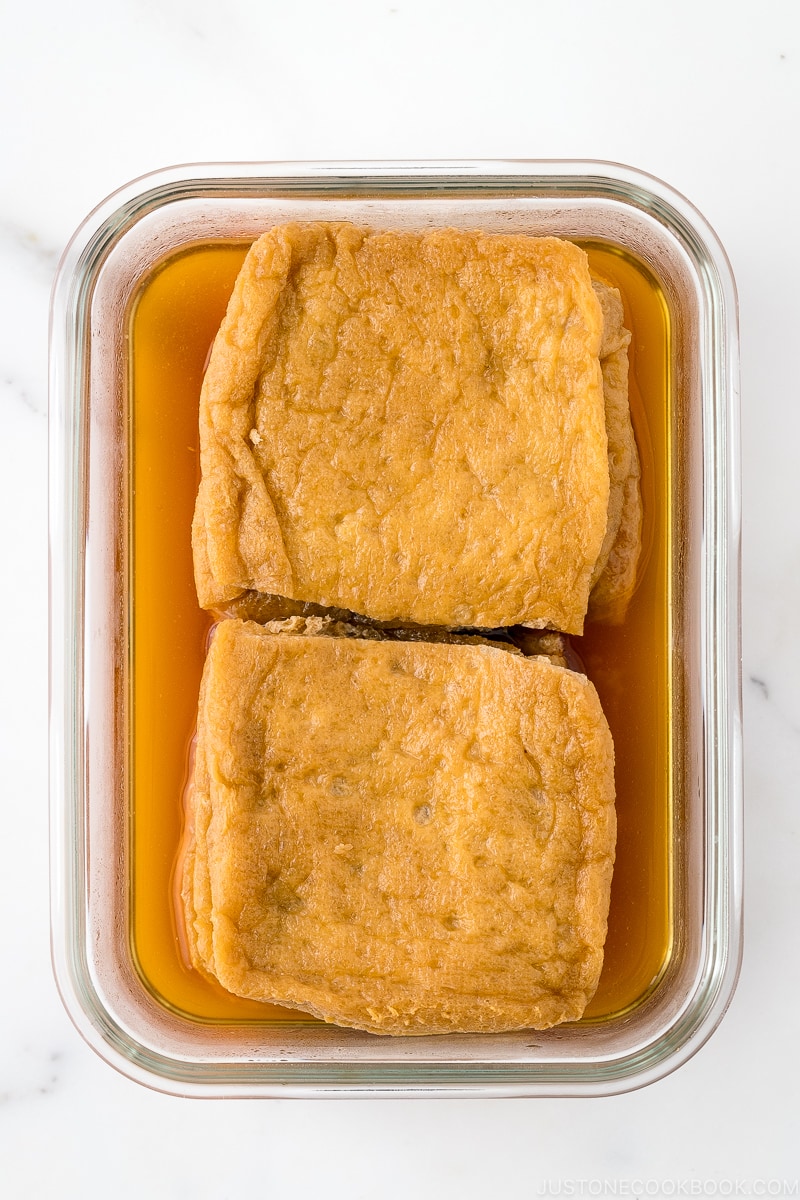
An Important Cooking Tool for Making Inari Age
Because the aburaage (tofu pouch) is lightweight and floats at the surface of the liquid, you will need a drop lid called otoshibuta (落し蓋) when you simmer them in the pot.
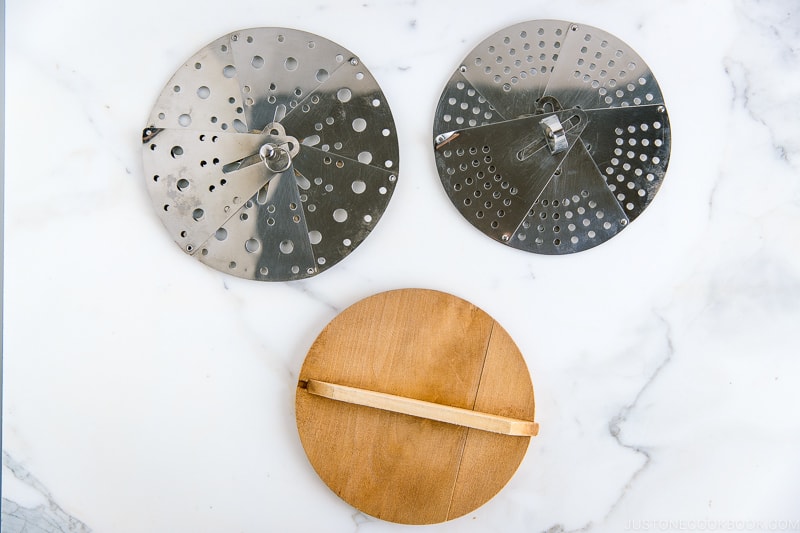
The otoshibuta is a tool that we commonly use when making simmered dishes. It helps to distribute the simmering broth evenly and prevent evaporation. If you don’t have one, you can make an otoshibuta with a sheet of aluminum foil.
I use an adjustable stainless steel otoshibuta, which can change the size of the drop lid based on the size of the pot.
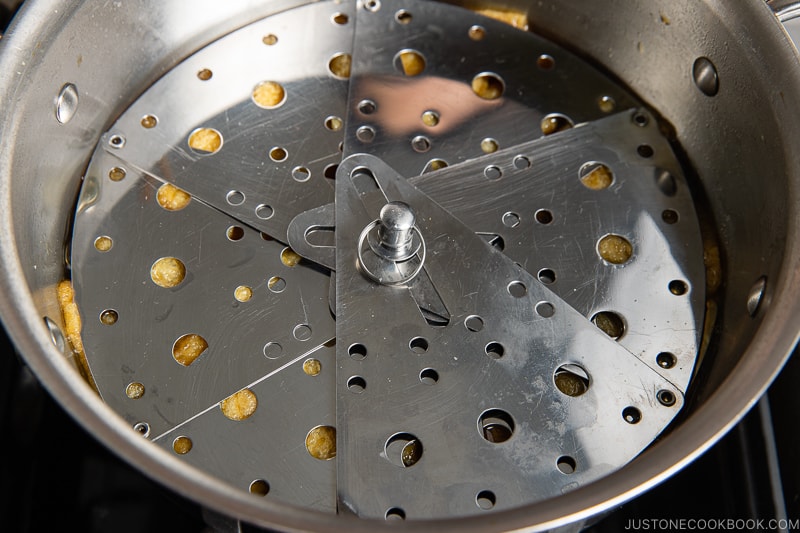
As the tofu pouches are cooked gently in the savory dashi-based broth, they absorb the amazing umami flavor and capture some of the juices for the best flavor.
Homemade vs. Store-Bought Inari Age
As I mentioned earlier, I often find store-bought Inari age too sweet for my liking. Therefore, if you can find aburaage in your Japanese grocery store, I highly recommend making your own Inari age.
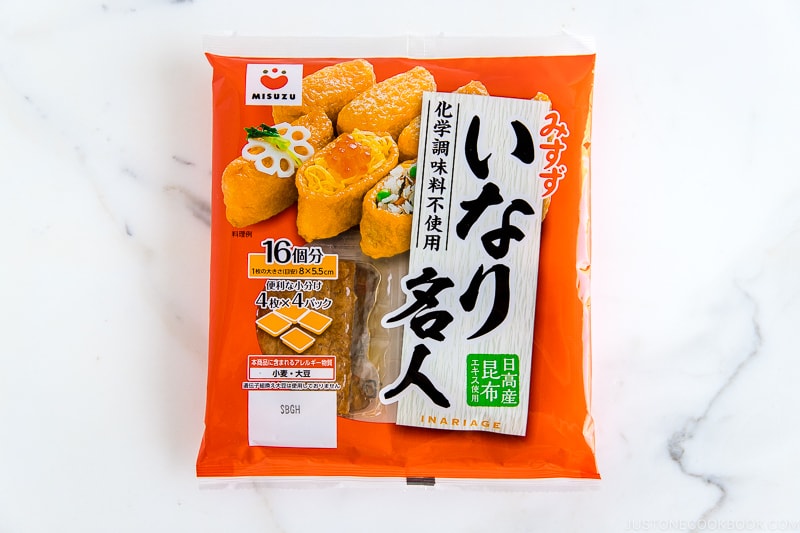
However, I’ve heard it’s very difficult to find aburaage as the majority of Asian grocery stores don’t carry it. In that case, you may find the store-bought Inari age very convenient when you want to make Inari sushi and kitsune udon.
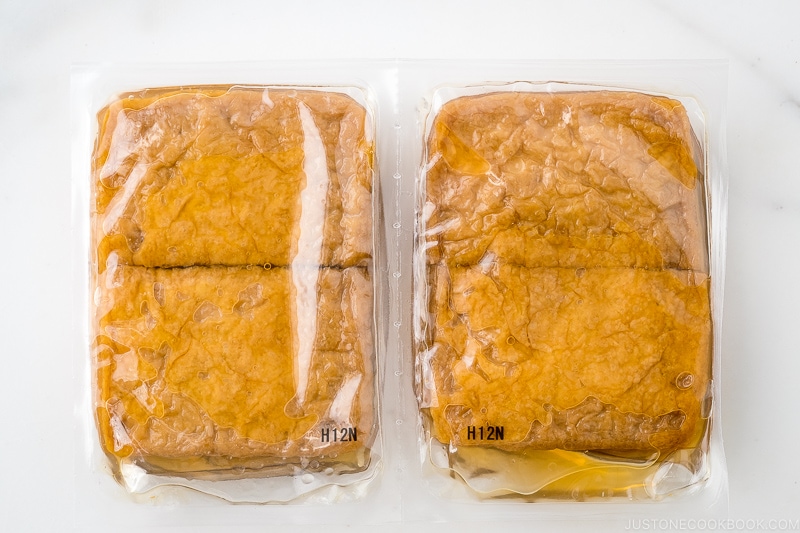
Typically, you can find it in the refrigerator or freezer section at Japanese or Korean grocery stores. You may find canned Inari age which is also available on Amazon.
Delicious Recipes Using Inari Age
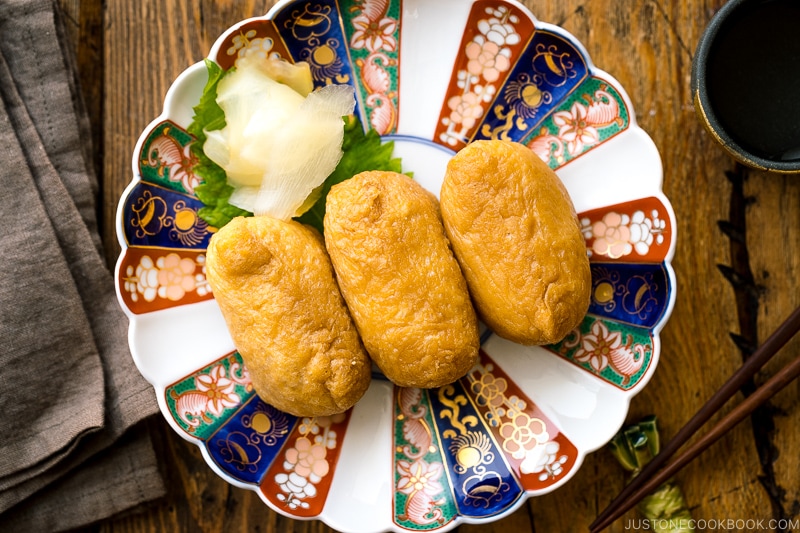
Stuff your homemade Inari age with vinegared rice and make Inari sushi! The sushi rice contrasts beautifully with the well-seasoned tofu pouches and you can never get enough of each bite!
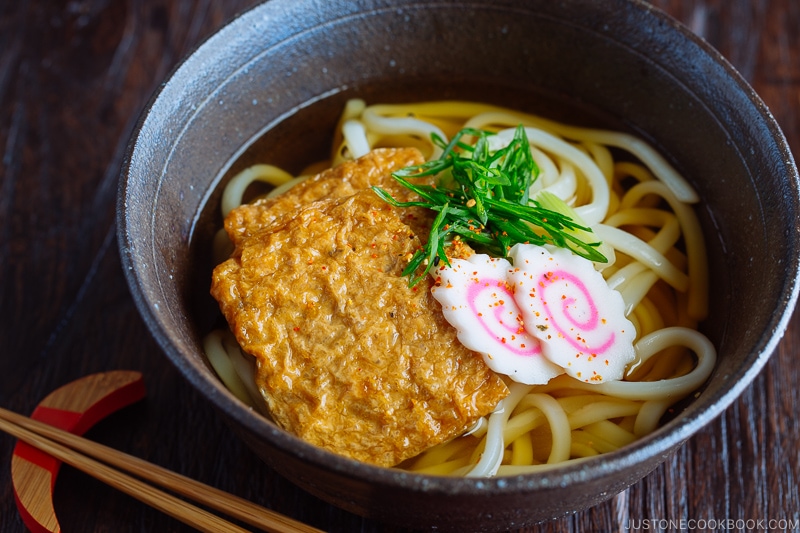
Top your udon noodle soup with Inari age for the classic kitsune udon!

Wish to learn more about Japanese cooking? Sign up for our free newsletter to receive cooking tips & recipe updates! And stay in touch with me on Facebook, Pinterest, YouTube, and Instagram.
Homemade Inari Age
Ingredients
- 6 pieces aburaage (deep-fried tofu pouch)
- 1½ cups dashi (Japanese soup stock) (use standard Awase Dashi, dashi packet or powder, or Vegan Dashi)
- 3 Tbsp soy sauce
- 3 Tbsp mirin
- 3 Tbsp sugar
Instructions
- Before You Start: I want you to consider doubling the ingredients, especially if you‘re making Inari Sushi. Why? The aburaage is very fragile and you may end up breaking the pouches and making holes. It‘s always nice to have backup pouches! Now, gather all the ingredients.
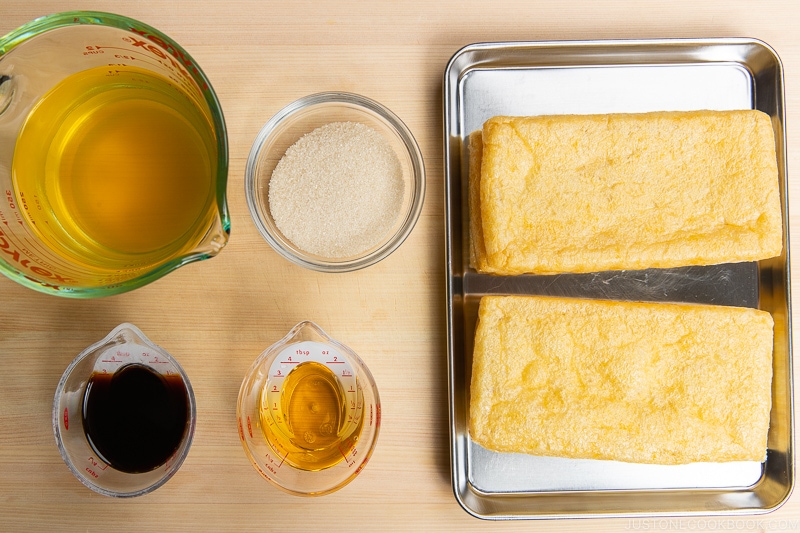
To Prepare the Aburaage
- Bring a medium saucepan of water to a boil. Meanwhile, cut 6 pieces aburaage (deep-fried tofu pouch) in half crosswise. Gently open the aburaage pouches all the way to the bottom. It‘s easier to separate the skin at this step than trying to open it after simmering.
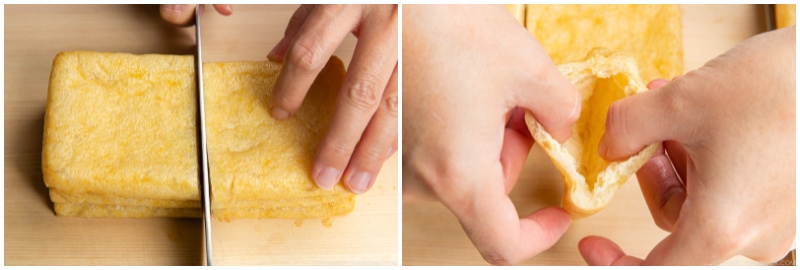
- If a pouch is hard to open, gently roll it with a chopstick. This rubbing helps to separate the two sides and make it easier to open the pouch.
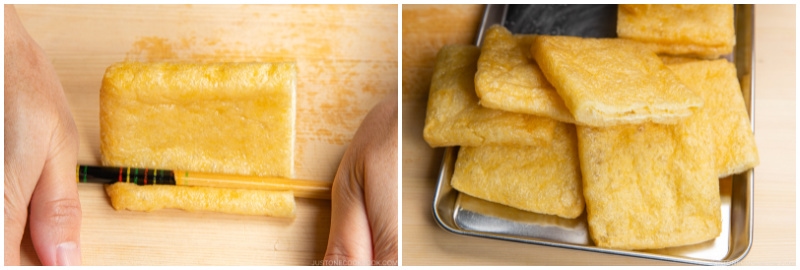
- When the water is boiling, cook the aburaage for 2 minutes while pressing them down into the water and turning them over. This helps to remove the factory oil used for deep-frying.
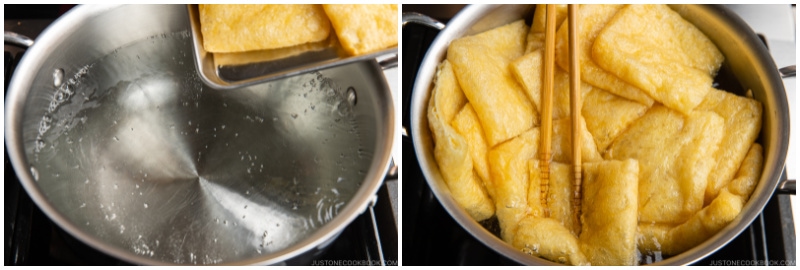
- Drain the aburaage into a sieve and rinse the saucepan. Gently press the aburaage with a ladle to squeeze out the water. Do not press hard as the aburaage tears easily.
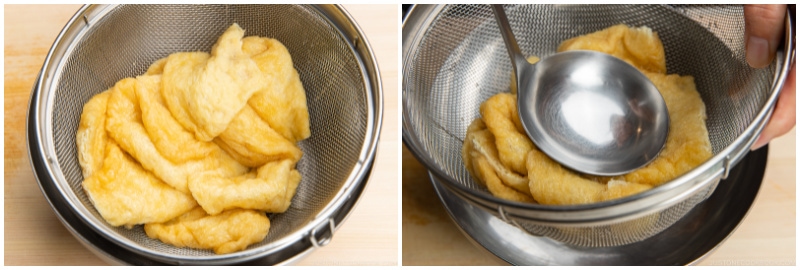
To Cook the Inari Age
- In the same saucepan, combine 1½ cups dashi (Japanese soup stock), 3 Tbsp soy sauce, 3 Tbsp mirin, and 3 Tbsp sugar. Bring it to a boil.
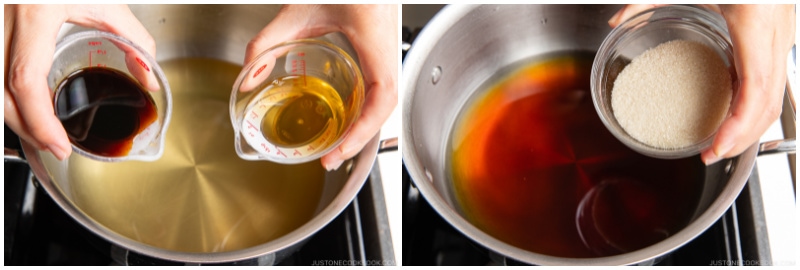
- Once boiling, add the aburaage to the saucepan. Layer them in a flower petal-like shape around the pan. This makes it easier to flip the aburaage later.
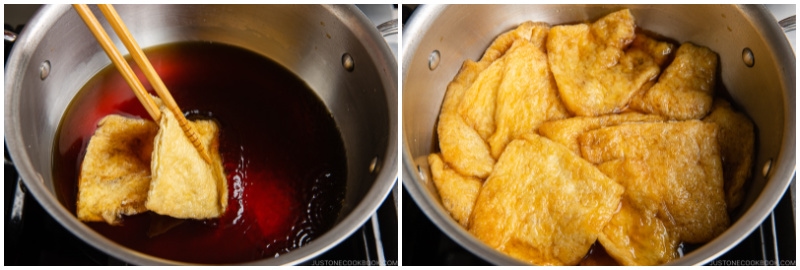
- Place an otoshibuta (drop lid) directly on the surface of the aburaage (you can make your own drop lid with aluminum foil). Cook on medium-low heat for 30–40 minutes. Flip the aburaage occasionally to make sure they‘re simmering evenly. If the cooking liquid reduces rapidly, your heat is probably too high, so turn down the heat to low.
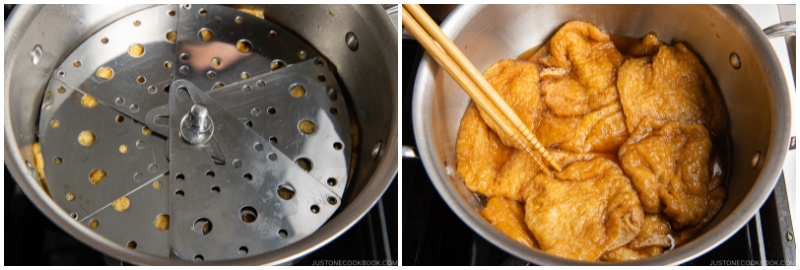
- When there is ¼–½ inch (1 cm) of cooking liquid left in the saucepan, remove it from the heat. Let the aburaage soak in the cooking liquid until it cools completely.
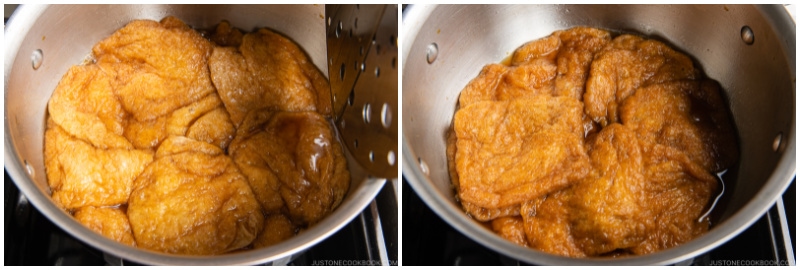
To Serve
- Your homemade Inari age is now ready to use in recipes like Inari Sushi and Kitsune Udon.
To Store
- Transfer the Inari age and cooking liquid to an airtight container. Store it in the refrigerator for 3 days and in the freezer for 3 weeks.
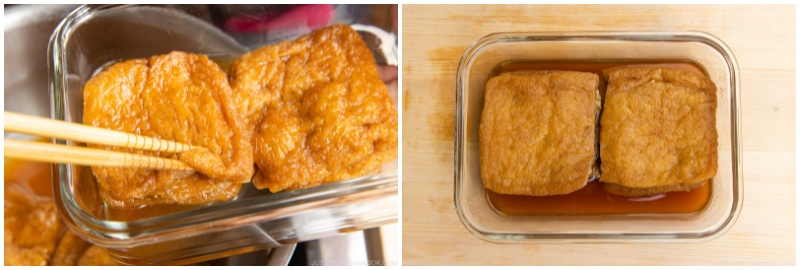
Nutrition
Did you make this recipe?
Tag @justonecookbook on Instagram so we can see your delicious creation!
Editor’s Note: This post was originally published on March 6, 2013. The post has been updated with new images and a revised recipe in December 2021.



